Five Factors to Consider When Selecting Machined Pin Receptacles for Mission-Critical Connections
When the cost and consequences of failure are significant, machined pins and receptacles provide additional reassurance.
Machined pin receptacles are precision manufactured solutions that directly contribute to the design of durable, high-reliability connector systems. High-quality, precision-machined pins and receptacles are the very foundation of high-performance connectors used to deliver power and signal in rigorous operating conditions, including in automotive, medical, and military/aerospace applications where the stakes are high.
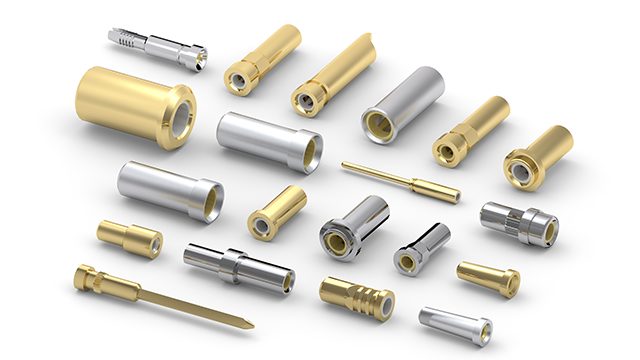
Mill-Max pin receptacles can accommodate a wide range of components, including relays, DC/DC converters, power supplies, switches, LEDs, seven-segment displays, capacitors, clock oscillators, and sensors.
Many electronic systems require interconnectivity between PCBs. Pin receptacles make devices and modules pluggable for assembly, repair, and replacement. The configurations can vary, but daughter cards that plug into motherboards are common. In addition, some PCBs connect edge to edge, while others are vertically stacked. But versatile interconnect suppliers can design and develop pin receptacles that support the full range of possible configurations.
To specify the right machined pin receptacles for your application, consider these five factors.
1. Application Environment and Performance Demands
Machined pin receptacles are a strong choice for connectors used in critical applications that demand exceptionally high performance in harsh operating environments, such as automotive, medical, and mil/aero applications. When the cost and consequences of failure are significant, integrating these components into your connectivity solution provides additional reassurance.
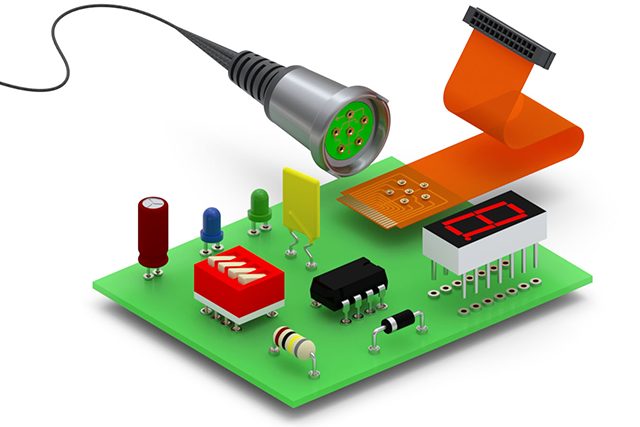
Mill-Max pin receptacles are available in many sizes in both solder-mount and press-fit options. A range of internal contact choices also address lead size, force, and temperature requirements.
2. Reliability
Applications that require connections to be mated and unmated with any frequency require higher reliability and durability solutions than applications with low mating cycles. Consider the number of insertions and extractions that are likely to occur over the life of the product, as well as other environmental conditions.
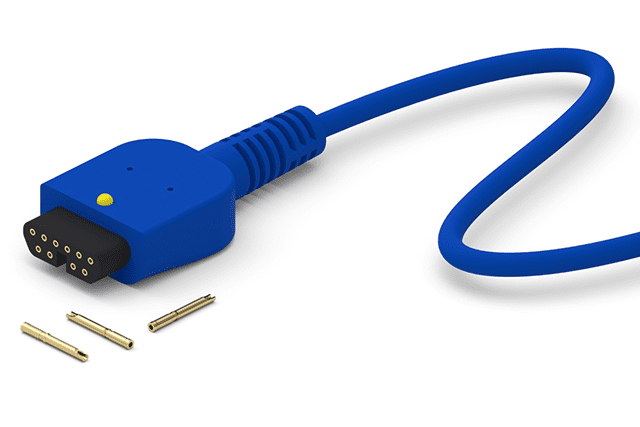
Many connector manufacturers rely on precision-machined receptacles for assembly processes such as insert molding, press-fitting, and ultrasonic welding.
Critical applications require the highest connector reliability to cope with temperature extremes, shock, vibration, debris, moisture, and other stress factors. Two-piece pin receptacles offer multiple internal contact options that allow users to tailor their selections to satisfy specific application demands, including high temperatures and specific insertion and extraction forces, without altering the outer shell housing.
Machined pin receptacles with beryllium copper (BeCu) inner contacts offer superior electrical performance compared to other materials, as well as the highest level of interconnect reliability. Precision-machined receptacles with BeCu contacts are more precise and consistent than one-piece connector technologies in both testing and field conditions. When they’re plated with gold, they also deliver superb electrical conductivity. In addition, the reliability of machined pin receptacles in high-temperature applications can be further improved by using internal contacts made from beryllium nickel (BeNi). These clips easily handle applications where continuous operating temperatures exceed 150°C.
3. Precision
High precision interconnects are a must in small devices and individual circuits within complex larger systems, such as automotive applications, where the smallest possible components help reduce volume and weight. Pin receptacles that are precision machined deliver flush-mount solutions that accept a range of mating lead diameters to suit various interconnect requirements while maintaining a zero above-board profile. Precision machining also permits more complex design features to be incorporated in some applications.
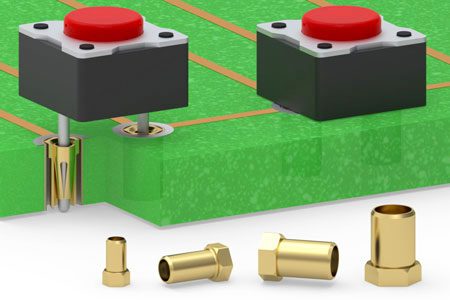
Mill-Max delivers flush-mount, precision-machined receptacles that accept a range of mating lead diameters to suit various interconnect requirements while maintaining a zero above-board profile. The smallest of the receptacles has a lead acceptance range of just 0.008–0.013” (0.2–0.33mm) in diameter, while the largest accepts 0.045–0.065” (1.14–1.65mm). These receptacles also have an open bottom that allows leads to pass through and are designed to have a minimal overall length, both of which are useful features for low-profile, board-stacking applications.
4. Quality
The quality of an interconnect component is determined by a superior design, the use of performance materials, such as brass and beryllium copper, precision machining with tolerances to ±0.0005” or better, and superior gold-plated finishes. Quality can be tested and verified to conform to one or more industry standards to ensure longevity and dependable service. Additional benefits of high-quality interconnect components include the ability to deliver gas-tight connections, a range of mating interface sizes, long mechanical lifetimes without degradation of insertion/withdrawal force, and consistent performance under demanding environments and use conditions.
If cost is a primary consideration, gold plating can be limited to the internal contact, and the outer shell housing of the receptacle can be plated with a more cost-effective and solderable tin or tin-lead compound. This alternative still ensures excellent electrical connection in the receptacle’s most critical area — the internal contact — while maintaining a robust and reliable gold-to-gold connection.
5. Vendor Versatility
Pin receptacles are available in many sizes and in both solder-mount and press-fit options. Look for vendors that offer a range of internal contacts to better address a range of lead size, force, and temperature requirements. It is also a good practice to ask vendors whether their machining capabilities allow for precisely controlled lengths, diameters, and hole depths, as well as special characteristics, such as multi-faceted press-fit shapes, and wire termination features including solder cup, crimp, forked, and bifurcated terminations.
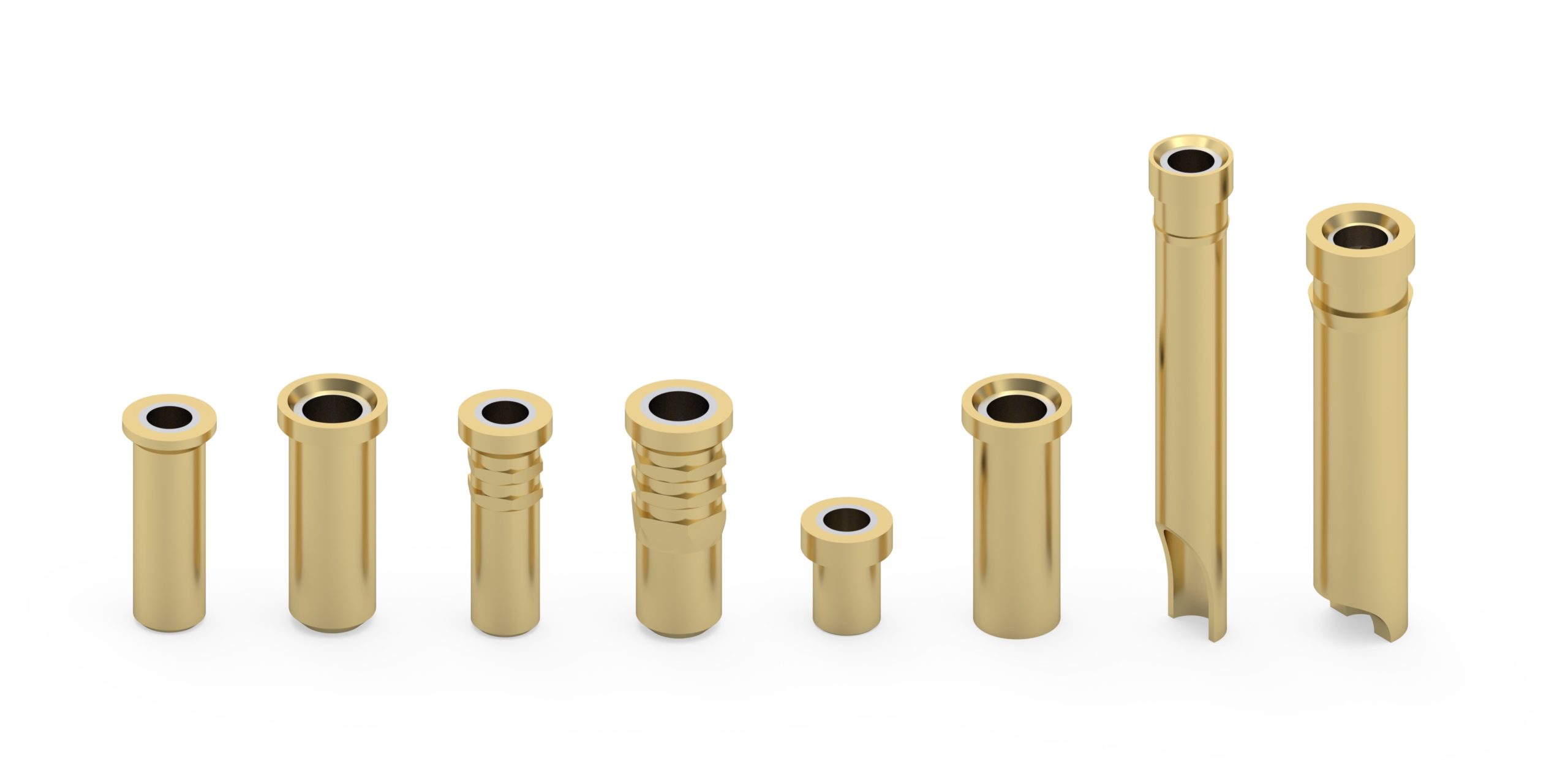
Mill-Max precision machined pin receptacles.
A varied vendor design portfolio will support surface-mount, through-hole, press-fit, solderless press-fit, low-profile, and innumerable combinations of receptacles in tandem with male pins to accommodate any spacing requirements in board-stacking applications. The combination of horizontal surface-mount or right-angle through-hole receptacles and male pins is ideal for a variety of card edge and perpendicular board-to-board connection applications. Vendor versatility also includes the ability to make, design, and develop custom products. Tooling costs for custom machined pin receptacles are negligible compared to the cost of new tooling and dies for stamped pins.
Another critical measure of vendor versatility is the availability of packaging options including carrier sockets, tape and reel, and bulk. With carrier sockets, SIP, DIP, PGA, or custom configurations, the receptacles come pre-loaded on male carriers so they can be placed as a group into the PCB holes and soldered before the carrier is removed to create low-profile receptacle assemblies. This assembly approach takes a fraction of the time it takes to install individual receptacles. Receptacles packaged on tape and reel are also available for automated assembly, and bulk products can be auto-assembled utilizing bowl-fed electronic assembly equipment.
Visit Mill-Max online to learn more.
Subscribe to our weekly e-newsletters, follow us on LinkedIn, Twitter, and Facebook, and check out our eBook archives for more applicable, expert-informed connectivity content.







